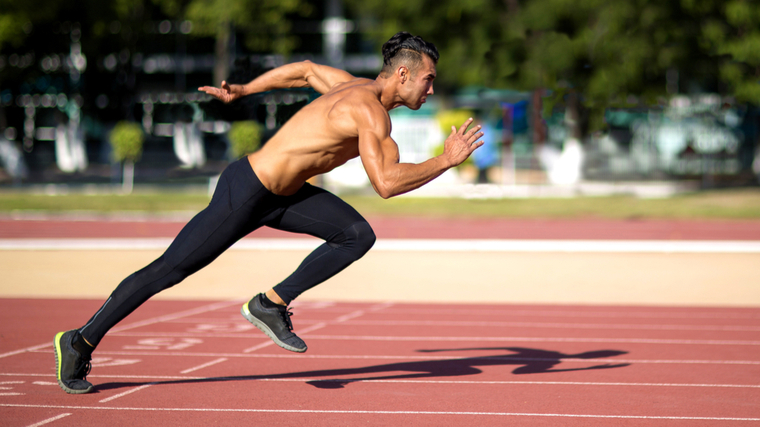Coffee, java, joe. It’s one of the most popular drinks in the world and contains one of the most widely-used performance aids on the market — caffeine. Caffeine is often added to pre-workout supplements and energy drinks, and caffeine anhydrous is the form commonly studied in research.
Athletes and gymgoers the world over rely on caffeine in one form or another to increase their strength in the weight room, run farther on the track, or jump higher on the court. Research on caffeine supplementation is compelling, but can you reap the same benefits from your favorite dark roast at home?
How Does Coffee Affect the Body?
Coffee contains caffeine, which acts as a stimulant, and other compounds that could improve your mood and general health while feeding some of your gut microbes. (18) The caffeine content of coffee varies, but an average cup contains about 100 milligrams of caffeine.
Caffeine has been shown to improve multiple markers of exercise performance by preventing fatigue, enhancing cognitive function, altering the recruitment of muscle fibers, and reducing pain sensations. (12)
Digestion & Absorption
About one hour after you drink your coffee, the caffeine is completely absorbed, and your serum caffeine levels will peak anywhere from 15 to 120 minutes later. Caffeine has a half-life of 2.5 to 10 hours, which means half of the caffeine you ingested may still be present in your bloodstream up to 11 hours after your first sip, although this varies by factors like age, gender, and genetics. (1)

In addition to caffeine, coffee contains chlorogenic acids which likely contribute to its anti-inflammatory and antioxidant effects. These compounds are poorly absorbed, so most reach the colon where they’re metabolized by some beneficial gut microbes (making them prebiotic). (18) Coffee also helps induce bowel movements by stimulating muscular contractions in the large intestine.
Mental Effects of Caffeine
Caffeine is a psychoactive substance structurally similar to adenosine, a compound that causes fatigue. Caffeine blocks adenosine from binding to its receptor, reducing or preventing your perception of tiredness. (12) Caffeine can also indirectly affect dopamine activity in the brain, which could explain some of its mood-enhancing effects. (14)
Frequent coffee-drinkers can sometimes become habituated to caffeine, with a need to drink more coffee for the same level of effect. Researchers are still trying to figure out whether this reduces the ergogenic effects of caffeine, but most findings indicate that your morning cup of joe won’t hinder the benefits of separate pre-workout supplementation. (5)(7)(9)(19)
Physical Effects of Caffeine
Caffeine may increase the release of calcium in muscle cells, leading to more effective muscle contraction. It could also increase the responsiveness of muscle fibers to signals from the nervous system. This translates to greater potential force production during resistance training. (4)(12)
Emerging research suggests that caffeine might reduce pain during and after workouts, with lower ratings of pain during difficult sets and less muscle soreness reported in some studies. (12)(13) The caffeine and caffeic acid in coffee support glucose metabolism, and coffee specifically has been shown to support recovery by enhancing glycogen replenishment after exercise, to better prepare you for your next workout. (16)
Caffeine can also increase lipolysis, which refers to the release of stored fats into bodily circulation to be converted into usable energy. (15) However, this doesn’t necessarily mean that you’ll lose fat by drinking coffee. A well-planned diet focused on a moderate caloric deficit is still essential to shedding fat.
How Coffee Affects Workouts
Generally speaking, caffeine is an effective ergogenic aid across the board. Individual responses vary for many reasons, but on average, if you take caffeine — from coffee or as a pill — before a workout, you will probably be able to move a little more weight, jump a little higher, or run a little faster.
Some research indicates that people with a specific gene mutation might benefit more from caffeine supplementation, while others may perform worse. (22) However, results between studies are inconsistent, and some have found no interaction between participants’ genes and the ergogenic effects of caffeine. (1)(12)
Caffeine might not be as effective if you’re sleep-deprived or working out after an overnight fast, though, so it can’t replace a good night’s sleep or solid pre-workout meal. (3)(12)(17)
Strength & Power
Muscular strength refers to the amount of force produced, and power essentially measures how quickly the force can be produced. Strength is often tested with a one-rep-max test, while power can be assessed with a vertical jump or repeated sprint test (among other, more grueling options).
Caffeine increased upper body strength in a one-rep-max test by an average of 3.2 kg according to one meta-analysis, but this improvement wasn’t apparent in lower body exercises. (11) Caffeine didn’t improve power output during a 30-second cycling sprint test performed by experienced cyclists, but it did improve power production during shorter 10-second cycle sprints, half-squat exercises, vertical jump tests, and medicine ball throws. (3)(10)(4)(19)

[Read More: The Most Effective Workout Splits, Created by Our Experts]
Though individual responses are variable, caffeine is likely beneficial for resistance training, plyometrics, and very short bouts of sprinting.
Muscular Endurance
Muscular endurance, or the ability to repeatedly contract a muscle over an extended period of time, is often tested by performing reps to failure or measuring the time that person can maintain a specific level of force.
In one of the few studies that recruited female participants, caffeinated coffee led to modest improvements in lower body endurance which translated to about two more reps of back squats during the first of three sets. There were no differences for the rest of the sets, though, and no effects on upper body muscular endurance. (13) However, other studies have observed greater improvements in muscular endurance, and the evidence generally favors caffeine as an ergogenic aid for high-rep work. (11)
Aerobic Performance
According to some meta-analyses, caffeine supplementation can improve speed and power output by as much as 3%. (20) That may not seem like much of an improvement, but when applied to something like a half-marathon, it translates to minutes gained overall.
Shorter events of 800 meters, three kilometers, five kilometers, and one mile have also been studied, and caffeine improved performance in all but the 800-meter run. Participants in that study were fasted, which may have blunted the potential ergogenic effects of the caffeine. (5)(6)(14)(17)
The Placebo Effect
Just thinking that you’re drinking caffeinated coffee could have a potent placebo effect. One small study recruited 10 competitive cyclists who tried to guess whether they consumed caffeine or a placebo before their anaerobic test. Those that (incorrectly) believed they consumed caffeine reached peak power about one second faster than their counterparts who accurately guessed that they’d gotten the placebo.

A performance boost was also observed in another study where all of the participants received a placebo, but were told that they had ingested a caffeinated drink. (2)
Summary
Coffee is a tasty source of caffeine and chlorogenic acids, making it a cost-effective, health-promoting, and maybe even prebiotic ergogenic aid. It won’t replace solid nutrition and good sleep hygiene, but in most cases, it will boost mental and physical performance.
Even if you’re relying on the power of the placebo effect, there’s really no reason to stay away from your cup of comfort. Caffeine is one of the most widely-studied and well-backed performance enhancers in the world, so if you prefer a cup of black before your next workout, have at it.
Frequently Asked Questions
Clearly, there’s a lot more than meets the eye when it comes to coffee and its effects on performance. Here are a couple of common questions about coffee unpacked and answered in detail.
How much coffee should I drink before my workout?
The content of coffee varies, with the average cup containing about 100 milligrams. The minimum effective dose of coffee is estimated to be three milligrams per kilogram (mg/kg) of body weight. This would equate to about two cups of strong coffee for a person weighing 70 kilos, or 154 pounds. Five or six milligrams per kilogram is a common, well-tolerated dose. Many people report negative side effects at higher doses. (11)
When should I take coffee before my workout?
Based on the absorption rate and half-life, most sources suggest taking coffee about 1 hour before you plan to start your workout. (11) Keep in mind that half of the caffeine you’re ingesting now will still be present in your bloodstream anywhere from 2.5 to 10 hours later, and taking it too late in the day could interfere with your sleep quality.
Are there downsides to drinking coffee before my workout?
Coffee stimulates bowel movements, so drinking your two cups of joe too close to your workout could land you on the toilet instead of the platform. Caffeine also stimulates the cardiovascular system, leading to elevated blood pressure and heart rate in some people. (11) High doses tend to lead to side effects like increased urination, heart palpitations, gastrointestinal distress, and sleep disturbances (especially if taken too close to bedtime). (21)
Practically speaking: though the caffeine in coffee is as effective as caffeine in other forms, drinking enough to ingest an ergogenic amount of caffeine could be difficult for some people. (12)
References
- Algrain, H. A., Thomas, R. M., Carrillo, A. E., Ryan, E. J., Kim, C.-H., Lettan, R. B., & Ryan, E. J. (2016). The Effects of a Polymorphism in the Cytochrome P450 CYP1A2 Gene on Performance Enhancement with Caffeine in Recreational Cyclists . Journal of Caffeine Research, 6(1), 34–39. https://doi.org/10.1089/jcr.2015.0029
- Anderson, D. E., German, R. E., Harrison, M. E., Bourassa, K. N., & Taylor, C. E. (2020). Real and Perceived Effects of Caffeine on Sprint Cycling in Experienced Cyclists. Journal of Strength and Conditioning Research, 34(4), 929–933. https://doi.org/10.1519/JSC.0000000000003537
- Anderson, D. E., LeGrand, S. E., McCart, R. D., Sciences, E., & Sciences, H. (2015).Effect of Caffeine on Sprint Cycling in Experienced Cyclists. Journal of Strength and Conditioning Research, 29(2), 513–520. https://doi.org/10.1519/JSC.0000000000002685
- Castillo, D., Domínguez, R., Rodríguez-Fernández, A., & Raya-González, J. (2019). Effects of caffeine supplementation on power performance in a flywheel device: a randomised, double-blind cross-over study. Nutrients, 11(2). https://doi.org/10.3390/nu11020255
- Clarke, N. D., & Richardson, D. L. (2021). Habitual caffeine consumption does not affect the ergogenicity of coffee ingestion during a 5 km cycling time trial. International Journal of Sport Nutrition and Exercise Metabolism, 31(1), 13–20. https://doi.org/10.1123/IJSNEM.2020-0204
- Clarke, N. D., Richardson, D. L., Thie, J., & Taylor, R. (2018). Coffee Ingestion Enhances 1-Mile Running Race Performance. International Journal of Sports Physiology and Performance, 13(6), 789–794. https://doi.org/10.1123/ijspp.2017-0456
- de Salles Painelli, V., Teixeira, E. L., Tardone, B., Moreno, M., Morandini, J., Larrain, V. H., & Pires, F. O. (2021). Habitual caffeine consumption does not interfere with the acute caffeine supplementation effects on strength endurance and jumping performance in trained individuals. International Journal of Sport Nutrition and Exercise Metabolism, 31(4), 321–328. https://doi.org/10.1123/IJSNEM.2020-0363
- Ferreira, R. E. S., Pacheco, R. L., de Oliveira Cruz Latorraca, C., Riera, R., Eid, R. G., & Martimbianco, A. L. C. (2021). Effects of Caffeine Supplementation on Physical Performance of Soccer Players: Systematic Review and Meta-Analysis. Sports Health, 13(4), 347–358. https://doi.org/10.1177/1941738121998712
- Glaister, M., Chopra, K., Pereira De Sena, A. L., Sternbach, C., Morina, L., & Mavrommatis, Y. (2021). Caffeine, exercise physiology, and time-trial performance: no effect of ADORA2A or CYP1A2 genotypes. Applied Physiology, Nutrition, and Metabolism = Physiologie Appliquee, Nutrition et Metabolisme, 46(6), 541–551. https://doi.org/10.1139/apnm-2020-0551
- Glaister, M., Towey, C., Jeffries, O., Muniz-Pumares, D., Foley, P., & McInnes, G. (2019). Caffeine and Sprint Cycling Performance: Effects of Torque Factor and Sprint Duration. International Journal of Sports Physiology and Performance, 14(4), 426–431. https://doi.org/10.1123/ijspp.2018-0458
- Grgic, J., Grgic, I., Pickering, C., Schoenfeld, B. J., Bishop, D. J., & Pedisic, Z. (2020). Wake up and smell the coffee: caffeine supplementation and exercise performance-an umbrella review of 21 published meta-analyses. British Journal of Sports Medicine, 54(11), 681–688. https://doi.org/10.1136/bjsports-2018-100278
- Grgic, J., Mikulic, P., Schoenfeld, B. J., Bishop, D. J., & Pedisic, Z. (2019). The Influence of Caffeine Supplementation on Resistance Exercise: A Review. Sports Medicine, 49(1), 17–30. https://doi.org/10.1007/s40279-018-0997-y
- Karayigit, R., Naderi, A., Akca, F., da Cruz, C. J. G., Sarshin, A., Yasli, B. C., Ersoz, G., & Kaviani, M. (2021). Effects of different doses of caffeinated coffee on muscular endurance, cognitive performance, and cardiac autonomic modulation in caffeine naive female athletes. Nutrients, 13(1), 1–17. https://doi.org/10.3390/nu13010002
- Khcharem, A., Souissi, M., Atheymen, R., Souissi, W., & Sahnoun, Z. (2021). Acute caffeine ingestion improves 3-km run performance, cognitive function, and psychological state of young recreational runners. Pharmacology Biochemistry and Behavior, 207(December 2020), 173219. https://doi.org/10.1016/j.pbb.2021.173219
- Kurobe, K., Nakao, S., Nishiwaki, M., & Matsumoto, N. (2017). Combined effect of coffee ingestion and repeated bouts of low-intensity exercise on fat oxidation. Clinical Physiology and Functional Imaging, 37(2), 148–154. https://doi.org/10.1111/cpf.12279
- Loureiro, L. M. R., Neto, E. dos S., Molina, G. E., Amato, A. A., Arruda, S. F., Reis, C. E. G., & da Costa, T. H. M. (2021). Coffee increases post-exercise muscle glycogen recovery in endurance athletes: A randomized clinical trial. Nutrients, 13(10), 1–13. https://doi.org/10.3390/nu13103335
- Marques, A. C., Jesus, A. A., Giglio, B. M., Marini, A. C., Lobo, P. C. B., Mota, J. F., & Pimentel, G. D. (2018). Acute caffeinated coffee consumption does not improve time trial performance in an 800-m run: A randomized, double-blind, crossover, placebo-controlled study. Nutrients, 10(6). https://doi.org/10.3390/nu10060657
- Nieman, D. C., Goodman, C. L., Capps, C. R., Shue, Z. L., & Arnot, R. (2018). Influence of 2-Weeks Ingestion of High Chlorogenic Acid Coffee on Mood State, Performance, and Postexercise Inflammation and Oxidative Stress: A Randomized, Placebo-Controlled Trial. International Journal of Sport Nutrition and Exercise Metabolism, 28(1), 55–65. https://doi.org/10.1123/ijsnem.2017-0198
- Sabol, F., Grgic, J., & Mikulic, P. (2019). The effects of 3 different doses of caffeine on jumping and throwing performance: A randomized, double-blind, crossover study. International Journal of Sports Physiology and Performance, 14(9), 1170–1177. https://doi.org/10.1123/ijspp.2018-0884
- Southward, K., Rutherfurd-Markwick, K. J., & Ali, A. (2018). Correction to: The Effect of Acute Caffeine Ingestion on Endurance Performance: A Systematic Review and Meta–Analysis (Sports Medicine, (2018), 48, 8, (1913-1928), 10.1007/s40279-018-0939-8). Sports Medicine, 48(10), 2425–2441. https://doi.org/10.1007/s40279-018-0967-4
- Wilk, M., Krzysztofik, M., Filip, A., Zajac, A., & Del Coso, J. (2019). The effects of high doses of caffeine on maximal strength and muscular endurance in athletes habituated to caffeine. Nutrients, 11(8), 12–14. https://doi.org/10.3390/nu11081912
- Wong, O., Marshall, K., Sicova, M., Guest, N. S., García-Bailo, B., & El-Sohemy, A. (2021). CYP1A2 genotype modifies the effects of caffeine compared with placebo on muscle strength in competitive male athletes. International Journal of Sport Nutrition and Exercise Metabolism, 31(5), 420–426. https://doi.org/10.1123/IJSNEM.2020-0395
Featured Image: Jacob Lund / Shutterstock